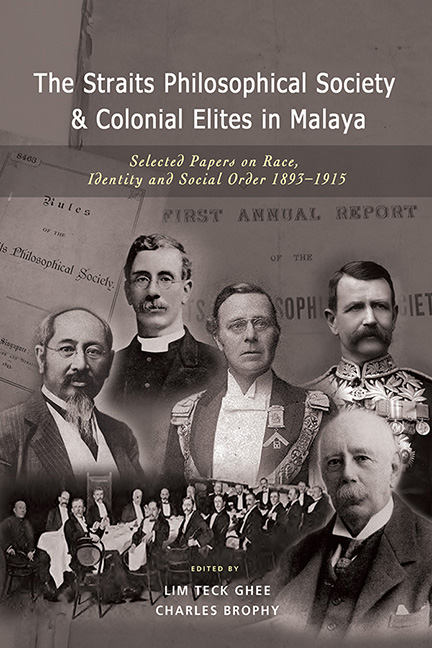 The Straits Philosophical Society and Colonial Elites in Malaya
The Straits Philosophical Society and Colonial Elites in Malaya Published online by Cambridge University Press: 09 January 2024
To judge of a religion from its literature is not perhaps entirely satisfactory, for there are influences which cannot be expressed in writing, and can only be gauged from their results on the lives of individuals, and on the progress and social condition of races. The investigation which is before us tonight has, however, the advantage of that accuracy which attaches to documentary evidence. In regard to those statements which are found in the works which Islam has produced in such abundance there can be no mistakes, except the bare possibility of errors of translation, which in these days of intensive linguistic studies are not liable to be frequent or important. The liability to pass an unfair judgment on Mohammedanism from a study of its literature is therefore confined to misinterpretations of the text, or to a one-sided selection of the works to be studied, or an unfair selection of extracts from those works. It will therefore be my endeavour to consider Mohammedan literature from many different points of view, and to take as great a variety of works as possible under review, in the hope that we may obtain as broad a view as possible of the teaching of Islam.
In the first place it seems obvious that we should devote a good deal of attention to the Koran itself, after which I propose to consider the main teachings of the Koran, the Traditions, and other current Moslem literature on certain fundamental subjects, such as the doctrine of God, the universe, science, the future life, sociology etc., in order to show the influence of their literature upon the Mohammedans themselves.
The Arabian prophet left nothing to his followers in his own writing. Moslem authorities are not even agreed as to whether he was able to read and write. It is quite certain, however, that the Koran is his own composition either written down by his amannenses, or immediately committed to memory and afterwards recited from time to time at public worship. The commentator Bukhari states that it was not until about a year after Mohammed’s death that the Koran was first collected as a whole.
To save this book to your Kindle, first ensure [email protected] is added to your Approved Personal Document E-mail List under your Personal Document Settings on the Manage Your Content and Devices page of your Amazon account. Then enter the ‘name’ part of your Kindle email address below. Find out more about saving to your Kindle.
Note you can select to save to either the @free.kindle.com or @kindle.com variations. ‘@free.kindle.com’ emails are free but can only be saved to your device when it is connected to wi-fi. ‘@kindle.com’ emails can be delivered even when you are not connected to wi-fi, but note that service fees apply.
Find out more about the Kindle Personal Document Service.
To save content items to your account, please confirm that you agree to abide by our usage policies. If this is the first time you use this feature, you will be asked to authorise Cambridge Core to connect with your account. Find out more about saving content to Dropbox.
To save content items to your account, please confirm that you agree to abide by our usage policies. If this is the first time you use this feature, you will be asked to authorise Cambridge Core to connect with your account. Find out more about saving content to Google Drive.